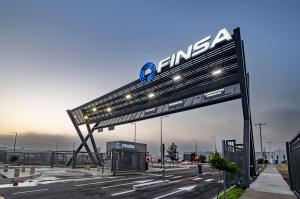Mexico´s FINSA launches $500 M Scheme to acquire stabilized industrial properties and boost sector growth
Mexico´s FINSA launches initiative to acquire stabilized industrial assets in Mexico, offering liquidity and growth through Sale & Lease Back schemes.
Through mechanisms such as Sale & Lease Back and portfolio acquisitions, supported by strategic partnerships with key players in Mexico’s financial sector, FINSA offers industrial property owners the opportunity to monetize their assets without disrupting operations, using customized lease agreements.
In addition to providing liquidity, this model helps improve financial indicators, reduce leverage, and offer greater flexibility and agility to respond to market changes. It is a key tool for companies looking to accelerate growth in a highly competitive environment.
“We aim to be a strategic partner for companies looking to grow, diversify, or invest in new capabilities. This model allows them to turn fixed assets into available capital without losing operational control—creating immediate opportunities to modernize, expand, or strengthen their market position,” said Sergio Argüelles, CEO of FINSA.
According to the company, Mexico’s industrial real estate market in 2025 maintains a strong outlook, driven by the expansion of logistics, automotive, and electronics sectors. Added to this is Mexico’s strategic position amid the reconfiguration of global trade, reinforcing the country’s competitiveness as a manufacturing and export platform.
With this initiative, FINSA reaffirms its confidence in Mexico’s medium- and long-term growth potential, as well as its commitment to sustainable industrial development, value creation, and the strengthening of the logistics and production ecosystems in Mexico and Latin America.
Contact:
Itzamara Sobrino / itzamara@marco.agency / Mobile: +52 55 6981 1824
About FINSA
FINSA is a Mexican company and a leader in industrial real estate development. Backed by 48 years of experience, it offers the broadest coverage in the country, with 28 industrial parks and over 70 locations nationally and internationally. FINSA manages and leases more than 3.7 million square meters of industrial space. It provides tailored real estate solutions for every stage of a project’s life cycle and across various industries. FINSA is a pioneer in sustainable building operations, accounting for 17% of all LEED-certified buildings in Mexico and is the world’s first developer to be certified as an Authorized Economic Operator.
Learn more at: finsa.net
ITZA SOBRINO
MARCO Agency
+52 55 6981 1824
itzamara|marco.agency| |itzamara|marco.agency
Visit us on social media:
LinkedIn
Instagram
Facebook
YouTube
X
Other
Legal Disclaimer:
EIN Presswire provides this news content "as is" without warranty of any kind. We do not accept any responsibility or liability for the accuracy, content, images, videos, licenses, completeness, legality, or reliability of the information contained in this article. If you have any complaints or copyright issues related to this article, kindly contact the author above.
Artificial Intelligence in Cybersecurity Market Set to Transform Threat Detection and Risk Management
Rising Vehicle Software Integration Drives Automotive OS Market to USD 20.4 Billion by 2032
CAGR of 3.5% | Alpaca Fiber Market Size, 2025 | Growing Demand and Business Outlook by 2031
Więcej ważnych informacji
 Jedynka Newserii
Jedynka Newserii

 Jedynka Newserii
Jedynka Newserii

Prawo

Kolejne polskie miasta chcą być przyjazne dzieciom. Planują stworzyć najmłodszym dobre warunki do rozwoju
Cztery miasta w Polsce posiadają tytuł Miasta Przyjaznego Dzieciom nadany przez UNICEF Polska. Dziewięć kolejnych miast czeka na certyfikację, a w ostatnich miesiącach do programu zgłosiło się kilka następnych. Na całym świecie inicjatywa została przyjęta już w ponad 4 tys. samorządów, a w Hiszpanii objęła połowę dziecięcej populacji miast. Program UNICEF-u ma na celu zachęcenie włodarzy do traktowania najmłodszych obywateli w sposób podmiotowy, respektowania ich praw i zaproszenia ich do współdecydowania o przyszłości.
Przemysł
W ciągu roku w Polsce ubyło 500 przedsiębiorstw odzieżowo-tekstylnych. Problemem są spadki zamówień z Europy Zachodniej i wzrost kosztów

Wartość rynku odzieżowego w Polsce wynosi 66,9 mld zł, z czego 10 mld zł to wartość krajowej produkcji – wynika z danych PIOT. Od czasu pandemii branża mierzy się z szeregiem wyzwań, wśród których najpoważniejsze to wzrost kosztów pracy i produkcji, przerwane łańcuchy dostaw i spadek zamówień – zarówno w kraju, jak i za granicą, a także wzrost nieuczciwej konkurencji na rynku, czyli głównie importu z Chin. Skala wyzwań sprawia, że w ubiegłym roku z rynku zniknęło 500 firm. Producenci odzieży apelują do rządu o wsparcie.
Handel
D. Obajtek: Orlen powinien być o 30–40 proc. większą spółką. Byłoby to z korzyścią dla konsumentów

Orlen jest największym polskim przedsiębiorstwem. Jego przychody ze sprzedaży w 2024 roku wyniosły blisko 295 mln zł, a rok wcześniej – ponad 372 mln – wynika z raportu Rzeczpospolitej „Lista 500”. W ubiegłorocznym rankingu Fortune 500 uwzględniającym największe korporacje znalazł się na 216. miejscu na świecie i 44. w Europie. Według Daniela Obajtka, europosła PiS-u i byłego prezesa Orlenu, spółka powinna jeszcze urosnąć, tym samym gwarantując konsumentom szereg korzyści, a także przyspieszać inwestycje m.in. w obszarze petrochemii i energetyki zero- oraz niskoemisyjnej.
Partner serwisu
Szkolenia

Akademia Newserii
Akademia Newserii to projekt, w ramach którego najlepsi polscy dziennikarze biznesowi, giełdowi oraz lifestylowi, a także szkoleniowcy z wieloletnim doświadczeniem dzielą się swoją wiedzą nt. pracy z mediami.









.gif)

 |
| |
| |
|